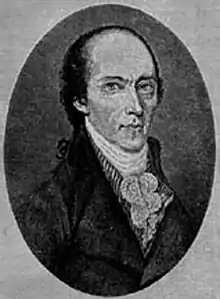William Maclay (Pennsylvania senator)
William Maclay (July 20, 1737 – April 16, 1804) was a politician from Pennsylvania during the eighteenth century. Maclay, along with Robert Morris, was a member of Pennsylvania's first two-member delegation to the United States Senate. Following his tenure in the Senate, he served in the Pennsylvania House of Representatives on two separate occasions, as a county judge, and as a presidential elector. He is known for his journal providing historical information on the 1st United States Congress.
William Maclay | |
|---|---|
 | |
| United States Senator from Pennsylvania | |
| In office March 4, 1789 – March 4, 1791 | |
| Preceded by | None |
| Succeeded by | Albert Gallatin |
| Member of the Pennsylvania House of Representatives | |
| In office 1795–1797 | |
| Personal details | |
| Born | July 20, 1737 New Garden Township, Province of Pennsylvania |
| Died | April 16, 1804 (aged 66) Dauphin, Pennsylvania |
| Nationality | American |
| Political party | Anti-Administration Party |
| Spouse(s) | Mary McClure Maclay (nee Harris, daughter of John Harris, Sr.)[1] |
| Residence | Harrisburg, Pennsylvania |
| Occupation | Lawyer, surveyor, Pennsylvania Legislature, U.S. Senator, Pennsylvania |
Biography
Maclay pursued classical studies and then served as a militia lieutenant in the Battle of Fort Duquesne in 1758. He went on to serve in other expeditions in the French and Indian Wars. He studied law and was admitted to the bar in 1760. After a period of practising law, he became a surveyor in the employ of the Penn family, and then a prothonotary and clerk of the courts of Northumberland County in the 1770s. During the American Revolution, he served in the Continental Army as a commissary. He was also a frequent member of the Pennsylvania General Assembly in the 1780s. During that period, he was also the Indian commissioner, a judge of the court of common pleas, and a member of the executive council.
After the ratification of the Constitution Maclay was elected to the United States Senate and served from March 4, 1789 to March 4, 1791. He received a two-year term instead of the usual six-year term for senators after he lost a lottery with the other Pennsylvania senator, Robert Morris. In the Senate, Maclay was one of the most radical members of the Anti-Administration faction.
He constantly feuded with Vice President John Adams in the Senate after Adams rejected Maclay's political deal to support his vice-presidential candidacy during the 1789 presidential election. In July 1789 he issued a resolution requiring the President to request the Senate's permission to dismiss Cabinet members, but it was defeated by Vice President Adams's tiebreaking vote when Adams convinced Tristram Dalton and Richard Bassett to withdraw their support. During Senate debates over the Residence Act establishing the site of the U.S. permanent national capital and seat of government Vice President Adams worked with Morris, who preferred Philadelphia as the capital, to defeat Maclay's motion placing it near his landholdings on the Susquehanna River.[2]
In his journal, which is the only diary and one of the most important records of the First United States Congress, he criticizes Vice President Adams and President George Washington. He also criticized many of their supporters who ran the senate and included particularly senators, believing that their ways of running the Senate were inefficient. He was unsuccessful in his attempt to be re-elected by the state legislature of Pennsylvania.
Maclay retired to his farm in Dauphin, Pennsylvania, but he was also a member of the Pennsylvania State House of Representatives in 1795, 1796, and 1797. In addition, he was a presidential elector in the 1796 presidential election, a county judge from 1801 to 1803, and a member again of the state House of Representatives in 1803. He was married to the daughter of John Harris, Sr., of Harrisburg, Pennsylvania. He died in 1804 and was interred in Old Paxtang Church Cemetery in Harrisburg. Several of his relatives were also politicians, including his brother, Samuel Maclay, and his nephew, William Plunkett Maclay.
Notes
- "The Maclays of Lurgan", Maclay, Edgar Stanton, 1889, Olgivie Press, Brooklyn New York, U.S. A., p.15
- "U.S. Senate: John Adams, 1st Vice President (1789-1797)". www.senate.gov. Retrieved 2020-12-29.
References
- Journal of William Maclay: United States Senator from Pennsylvania 1789–1791, Edited by Edgar S. Maclay, (1890). online edition
- Bowling, Kenneth R. and Veit, Helen E., ed. Documentary History of the First Federal Congress of the United States of America, 4 March 1789–3 March 1791. Vol 9: The Diary of William Maclay and Other Notes on Senate Debates. 1988. 532 pp. Baltimore: Johns Hopkins University Press, c1988.
- Trees, Andy. "The Diary of William Maclay and Political Manners in the First Congress." Pennsylvania History 2002 69(2): 210–229. ISSN 0031-4528
- Gearhart, Heber, The Life of William Maclay, Northumberland County Historical Society Proceedings, (2, ): 46–73.
- "William Maclay." Dictionary of American Biography. New York: Charles Scribner's Sons, 1936. Gale Biography In Context. Accessed 5 May. 2011. Gale Document Number: GALE|BT2310008518 Fee, via Fairfax County Public Library.
- United States Congress. "William Maclay (id: M000031)". Biographical Directory of the United States Congress.
- The Political Graveyard
External links
| U.S. Senate | ||
|---|---|---|
| Preceded by None |
U.S. senator (Class 1) from Pennsylvania 1789 – 1791 Served alongside: Robert Morris |
Succeeded by Albert Gallatin |
